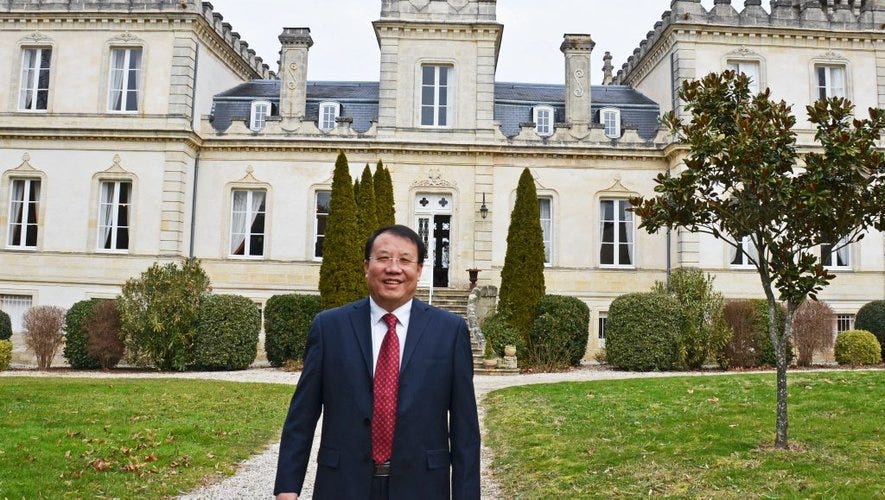Bonjour Global Jigsaw,
Have you had a nice glass of wine this weekend? I did. Following five months of abstinence because of the chemo, I had some red in anticipatory celebration of my last infusion, tomorrow. And it was all the more apposite given the focus of today’s post:
******
Over the last decade and a half, the hallowed French landscape of wine-growing Bordeaux, has been “sullied” in the eyes of some traditionalists, as names like Zhang and Li have taken their place on the list of the region’s wine barons. Rocketing figures for wine consumption in the Chinese mainland, combined with the reputation enjoyed by Bordeaux wines has made owning a French vineyard, or two, an attractive proposition for Chinese with cash to spare, something a fair number seem to have.
China is not a traditional wine-drinking nation. Still, in 2011 it surpassed the United Kingdom to become the fifth largest consumer of wine by volume, according to the International Wine and Spirits Research group.
Purchases by Chinese in Bordeaux began in 2008, when a trading company from Qingdao city bought Chateau Latour Laguens, a 30-hectare vineyard. By 2011, more prestigious estates like Chateau Laulan Ducos, classified as a Cru Bourgeois, began passing into Chinese hands.
During the Bordeaux en primeur tastings in 2011, when thousands of wine professionals from across the world travelled to the region to assess the year’s offerings, the estates offered vintage reports in three languages – French, English and Chinese. Bordeaux winemakers began to publish a recipe books pairing wines with Chinese dishes, suggesting, for example, a Saint-Emilion for pig’s feet.
I was based in Brussels at the time of the rise of the Chinese wine barons. And thus a chilly summer morning saw me board a train from the Gare du Midi bound for Bordeaux. I was off to meet Zhang Jin Shan, the new owner of Chateau du Grand Moueys, a middle-sized estate in the picturesque entre-deux-mers area.
The meeting had not been easy to organize, given that Zhang lived in northern China’s Ningxia province and was only occasionally in Europe. I’d been in touch with a certain Aline Moineau, the chateau’s long-standing manager, for a month before my efforts had yielded a two-hour slot with the Chinese entrepreneur on one of his flying visits to his new French chateau.
As the train neared Bordeaux I’d sent Aline a text message alerting her of my imminent arrival. “Don’t worry,” she texted back cheerily. “There will be someone waiting at the train station with a big shit with your name on it.”
At Bordeaux train station, the promised “big shit” of paper with my name on it materialized, and I was whisked off to the chateau. Grand Moueys, a neo-Gothic pile of stone, was located along the banks of the river Garonne, surrounded by a 170-hectare expanse of vineyards and forest. Florid turrets flanked its crenellated walls, bringing to mind a medieval world of knights, damsels-in-distress and romance. But seated within the Grand Moueys’ genteelly dilapidated dining room, the estate’s new owner did not cut a knightly figure.
Zhang Jin Shan was dressed in an ill-fitting pinstriped suit, with rimless glasses framing his mottled face. His bravado attempt at a comb-over did little to disguise his balding pate. It was eight in the morning when we met, and the 49-year-old Chinese entrepreneur was chomping, somewhat forlornly, on a croissant.
I’d asked Zhang how he’d been enjoying the local French food. The lord of the chateau glanced at his croissant dispiritedly. “Hai xing,” he replied with a shrug, using a phrase that in Chinese signifies only the faintest of approval. “I’ve got used to it,” he continued, unenthusiastically.
Zhang in front of his chateau
Aline Moineau, had pursed her lips so tight that they’d almost disappeared. But Zhang hadn’t appear to notice. He’d perked up talking about his plans for a “luxurious” 50-seat Chinese restaurant; the intended piece-de-resistance of the high-end hotel and spa into which Zhang meant to convert the chateau.
The food will be upscale Chinese, not the kind of sweet and sour gloop served up by the average take-out joint in Europe. “You know what I mean?” he’d asked. And I had, instantly conjuring up feasts of bullfrog’s ovaries and shark’s fin soup set out under enormous chandeliers and an abundance of red and gold.
I’d asked why he wanted to open a Chinese restaurant in a French chateau. Wouldn’t a French restaurant make more sense? “No,” he’d replied emphatically. “In France there are many French restaurants, but very few Chinese ones. The guests in my hotel will mostly be Chinese and the fact that they can find good food here will be attractive for them.”
“But perhaps they would want to try French food,” interjected Aline primly. “Please let Mr Zhang talk with the journalist first and ask your questions later,” snapped Sophie, the young Chinese woman who served as Zhang’s French interpreter.
There was an obvious clash of culture on display here. And one that fed into larger resentments against Chinese investments in Europe, even as these were actively being courted.
Thanks to the explosion of Chinese wine consumption, the price of Bordeaux wines had risen in those years, even though wine consumption in France itself (where 50-60 per cent of the region’s wines were sold) had been falling. Chinese consumers of wine had played an important part in ensuring Bordeaux continued to flourish despite the economic slowdown in Europe and aggressive competition from new world wines.
When Zhang bought Chateau du Grand Moueys it had been languishing on the market for over five years. Its then owners, the aristocratic German Bomer family, had been hard pressed to find takers for the Chateau’s 12 million euro price tag. Although the final price that Zhang bought the estate for was not public, he was believed to have paid a fair price.




